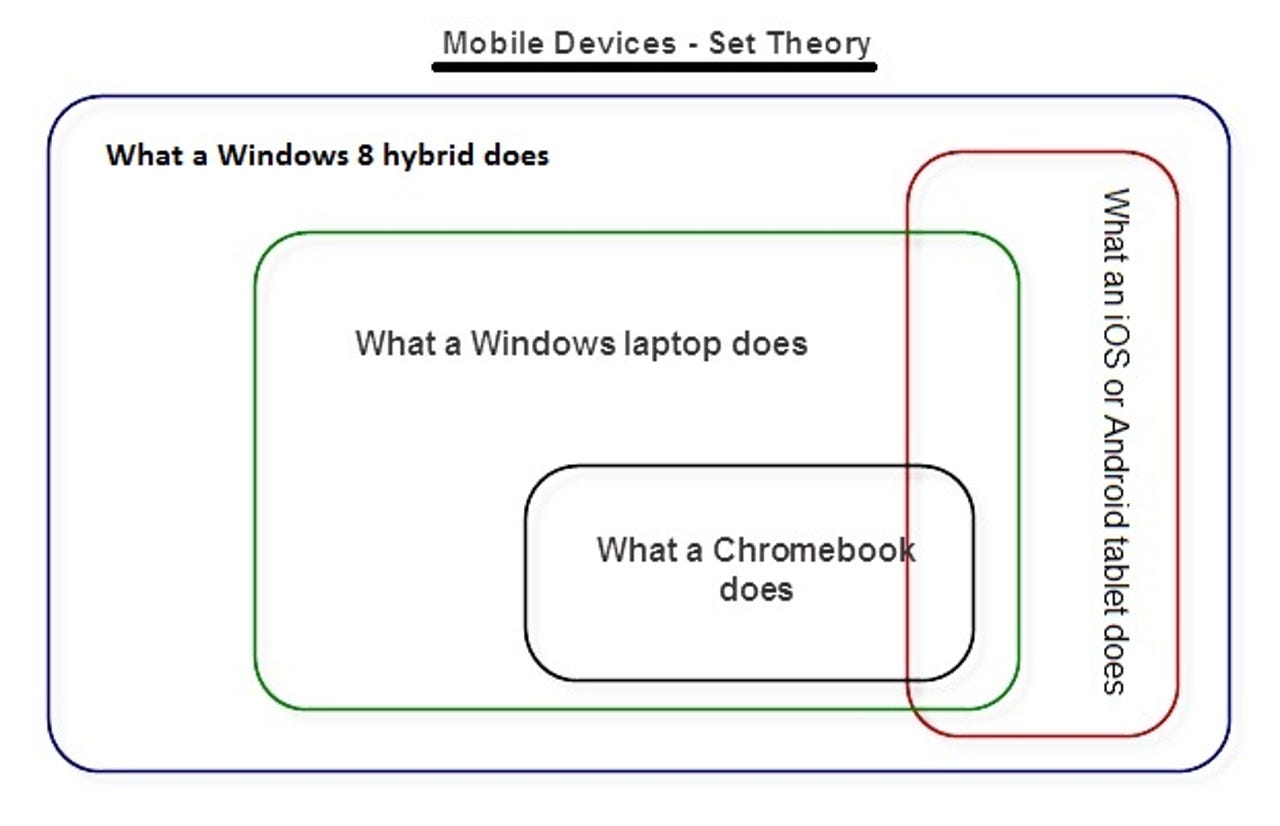Why there's no good reason to buy a Chromebook

[Math geek correction below. See the diagram caption.]
This is a great era for computer consumers. It's an era of bold experimentation in product design. Many different vendors are taking many different approaches to grab the consumer.
Some of these ideas are great ones and some of them are stupid and useless. I like to think of them in terms of how much they can do, or how practical they are to use for a wide variety of tasks. With that in mind, here's how I see the market for mobile computers (not counting phones):

In the diagram you can see a philosophy I've held ever since the iPad came out: Tablets do some cool and useful things, but they are far from being laptop replacements. I do a lot of typing and it just can't be done on glass. There are some great third-party keyboards for the iPad and other tablets from Zagg, Logitech and others, but they just don't work as well.
The diagram makes the point that Microsoft is taking a very different approach than Google, especially with regard to hybrid tablet/laptop devices like the Surface. You can see it in their ads about how "…the new Surface with Windows gives you one experience for everything in your life."
Someone correct me if I'm wrong, but as I see it, there's nothing you can do with a Chromebook that you can't do with a Windows laptop running Chrome. I just shopped a bit on Amazon and it looks like the prices aren't all that different. So what's the point of buying a Chromebook?
It's important to point out that just because product or segment A does as much and more as product or segment B, it doesn't follow that A does these things as well as B. Thus, many would argue that even if an Android tablet does everything (conceptually) that an iPad does, it doesn't do it as well. (And for sure, they would say, a Windows 8 tablet doesn't do it as well.)
Featured
But what does a Chromebook do? It runs Chrome. So can a Windows laptop. So can a MacBook.
The idea of the hybrids like the Surface is to address all these different sets of user needs. It's a tablet. It's a laptop computer running Windows and Office and all your other Windows programs. It runs Chrome, and therefore does everything a Chromebook does, and the cost is not all that different.
It's with the hybrids that most of the wacky system design is happening. You've got the Lenovo Yoga that flips over backwards. You've got the Dell XPS 12 with the screen that rotates inside a frame. You've got the HP ENVY with a display that pulls off. Windows 8 hybrids would be a slam-dunk if only Microsoft could get people more enthusiastic about Windows 8. Will Windows 8.1 turn the corner? I wouldn't bet on it, but perhaps. There's no question in my mind that Microsoft can get consumers to buy a lot of these devices just by flooding stores with them and promoting them properly.
It's no surprise that nobody (except for school districts) is buying Chromebooks. If you went into a store and saw all these things, or even a conventional Windows 7 laptop, and then saw a laptop that was basically just a web browser, which would you buy?